Mitchell Hadley's Blog: It's About TV!, page 99
March 19, 2021
Around the dial
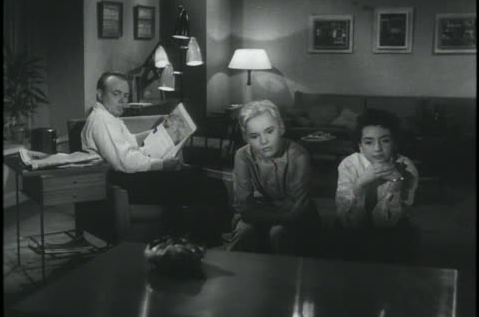
There are certain questions in life that are simply unanswerable. When did time begin? What is the true value of pi? Will the Chicago Bears ever find a quarterback? To those questions can now be added a new one: " Wait—that show was a hit? " That's David's topic at Comfort TV, as he looks back to forgotten, short-lived shows that were hits in their time.
At The Last Drive-In, monstergirl considers Michel Legrand's moody score for Norman Jewison's classic The Thomas Crown Affair, with Steve McQueen and Faye Duanway, and its memorable, Oscar-winning song " The Windmills of Your Mind ," sung by the former co-star of The Girl from U.N.C.L.E., Noel Harrison.
The Broadcatsing Archives at the University of Maryland links to a classic episode from the British series The Secret Life of Machines. It's a remastered cut of " The Secret Life of the Television Set ," which takes you inside the machine that takes us inside what goes on outside.
Television's New Frontier: The 1960s moves to 1962, and the debut of one of television's greatest sitcoms, the show that critics hated and the audience loved: The Beverly Hillbillies. Read about how Paul Henning's baby made it to the small screen , and the stars who made it work.
Terence at A Shroud of Thoughts is one who truly appreciates the actors and actresses, stars and everyday performers, who helped make the entertainment industry memorable, and never lets their passing go unnoticed. This week was particularly grim; this link is to his obit of Yaphet Kotto, but you'll also want to read about Frank Lupo, Henry Darrow, and Nicola Pagett.
At Shadow & Substance, Paul interviews Scott Skelton, co-author of the new book Rod Serling’s Night Gallery:The Art of Darkness , which contains high-quality reproductions of the paintings that did so much to make the show so evocative. Fans will not want to miss this.
Finally, a charmng way to end the week: at The Lucky Strike Papers, Andrew shares an audio recording of Your Hit Parade celebrating St. Patrick's Day, in 1952, with a performance of Andrew's mother, Sue Bennett, singing "Great Day for the Irish." TV
Published on March 19, 2021 05:00
March 17, 2021
What I've been watching: February, 2021

Shows I’ve Watched:Shows I’ve Found:The Roaring 20s
T.H.E CatChina: The Roots of Madness
The Lone Wolf
I'm now three-deep in the world of the Warner Bros. detective series of the late 1950s and early 1960s, having polished off Bourbon Street Beat and continuing to travel down 77 Sunset Strip. With Hawaiian Eye and Surfside 6 still to come, it seemed like a good time to try a slight variation on the theme, which is what Warners must have thought themselves when they introduced The Roaring 20s to the 1960-61 season.
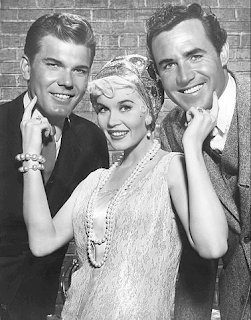 (L-R) May, Provine, ReasonPeople sometimes accuse WB of operating an assembly line of cookie-cutter series, but this just isn't true at all. After all, the other shows I mentioned all focus on private investigators, but The Roaring 20s clearly breaks the mold by giving us two newspapermen—Rex Reason as beat reporter Scott Norris and Donald May as columnist Pat Garrison—who, in the course of their reporting day, just happen to act like detectives by solving crimes. Now we're obviously talking about a different genre here. And as their female sidekick, Pinky Pinkham, Dorothy Provine cuts a figure far different from Connie Stevens of Hawaiian Eye; sure, they might both be singers, but Dorothy dances as well, and she owns the Charleston Club, where everyone hangs out when they're not breaking news or solving crimes. Only a pseudo-intellectual could possibly confuse the two. Finally, whereas the other WB detective shows were set in contemporary, glamouous locales like Hawaii, Florida and New Orleans, The Roaring 20s takes place in New York City in, well, the 1920s.
(L-R) May, Provine, ReasonPeople sometimes accuse WB of operating an assembly line of cookie-cutter series, but this just isn't true at all. After all, the other shows I mentioned all focus on private investigators, but The Roaring 20s clearly breaks the mold by giving us two newspapermen—Rex Reason as beat reporter Scott Norris and Donald May as columnist Pat Garrison—who, in the course of their reporting day, just happen to act like detectives by solving crimes. Now we're obviously talking about a different genre here. And as their female sidekick, Pinky Pinkham, Dorothy Provine cuts a figure far different from Connie Stevens of Hawaiian Eye; sure, they might both be singers, but Dorothy dances as well, and she owns the Charleston Club, where everyone hangs out when they're not breaking news or solving crimes. Only a pseudo-intellectual could possibly confuse the two. Finally, whereas the other WB detective shows were set in contemporary, glamouous locales like Hawaii, Florida and New Orleans, The Roaring 20s takes place in New York City in, well, the 1920s. There is one way in which all these shows are alike, though: they're all dumb fun to watch. I don't mean they're stupid, or that the people watching them are stupid, though certainly some of us are. No, like the other shows from the WB factory, The Roaring 20s doesn't present intellectually stimulating puzzles a la Sherlock Holmes, or feature angst-ridden antiheroes or tackle allegorical social issues. What it does do is give the viewer an hour (minus commercials) of entertainment built around a core of likeable characters whose job is to track down the bad guys before they get away with murder, with just enough period details to remind you that you're in a world where Prohibition is still the law of the land but there isn't an Eliot Ness around to enforce it. And while I'm not sure about you, I can really use that kind of entertainment these days.
Similar to the other WB shows, Reason and May rotate as the leads (except for the first episode, which introduces them both), and occasionally show up in cameos in the other's episode, with Provine the constant every week, singing a song or two and doing the Charleston. For awhile it looked as if that might be all she was going to do, but in the eighth episode, "White Carnation," Pinky gets to take the lead in a story about her old flame (Ray Danton), who's been released from prison on a trumpted-up charge and is out for revenge. TV being what it was back in the '60s, you know the two of them aren't going to wind up together, but even so that doesn't prevent the ending from generating a genuine pathos.
In fact, if there's one actual difference between The Roaring 20s and the other shows from WB, it's that the show plays things pretty straight, with less of the humor that marks the others. I don't mean to suggest that it's humorless—it's too entertaining for that—but there's none of the occasional jokiness or winking moments that one gets used to in, say, 77 Sunset Strip. The closest thing to comic relief is Gary Vinson, who as copy boy Chris Higby serves as a kind of apprentice Jimmy Olson, but they wisely keep him from getting too irritating, and use him mostly as a messenger for plot points.
You're not going to grow brain cells by watching The Roaring 20s, and you won't learn much about the history of the era (although you do get to see some cool stock footage!), but you're probably not going to shout at the screen or wind up hate-watching it, either. These days, you could do a lot worse.
t t t
It might help to think of T.H.E. Cat as a kind of American version of The Saint. Or maybe not. The improbably named Thomas Hewitt Edward Cat—T. Hewitt Edward Cat for short, and what kind of parents name their kid Tom Cat?—comes from a mysterious background: a former circus performer, a retired cat burgler, and now a professional bodyguard who uses his predatory intelligence, his cat-like reflexes, and his knowledge of martial arts in service of clients who need protecting from various baddies. Now that I think about it, with a background like that maybe he's a cross between The Saint and The Equalizer.
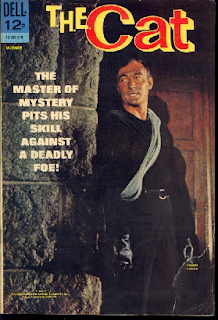 Robert Loggia plays Cat, and he does a good job in the role—a cultivated accent that manages not to sound (too) affected; an agility and abruptness in the way he moves that is, dare we say it, cat-like; and an intimidation factor, whether in suit and tie or his all-black working duds, that must rank somewhere around 9.5 on a scale of 10. Now that I think about it, maybe he's a cross between The Saint, The Equalizer and Palladin in Have Gun—Will Travel. Anyway, he's the kind of hero where you know he's always going to come out on top, and half the fun is waiting to see him give it to the bad guys. R.G. Armstrong plays Cat's police contact Captain McAllister, who's honest and well-meaning and, well, about as effective as any other police captain in a series where he isn't the star, which is to say that even when he has the building surrounded with an impenetrable ring of steel, the would-be killer finds a way to get inside, leaving it to Cat to save the day. Robert Carricart is appropriately mysterious as Pepe Cordoza, Cat's old friend who owns the restaurant out of which Cat operates. Now that I think of it, maybe that makes it a cross between The Saint, The Equalizer, Have Gun—Will Travel and Peter Gunn.
Robert Loggia plays Cat, and he does a good job in the role—a cultivated accent that manages not to sound (too) affected; an agility and abruptness in the way he moves that is, dare we say it, cat-like; and an intimidation factor, whether in suit and tie or his all-black working duds, that must rank somewhere around 9.5 on a scale of 10. Now that I think about it, maybe he's a cross between The Saint, The Equalizer and Palladin in Have Gun—Will Travel. Anyway, he's the kind of hero where you know he's always going to come out on top, and half the fun is waiting to see him give it to the bad guys. R.G. Armstrong plays Cat's police contact Captain McAllister, who's honest and well-meaning and, well, about as effective as any other police captain in a series where he isn't the star, which is to say that even when he has the building surrounded with an impenetrable ring of steel, the would-be killer finds a way to get inside, leaving it to Cat to save the day. Robert Carricart is appropriately mysterious as Pepe Cordoza, Cat's old friend who owns the restaurant out of which Cat operates. Now that I think of it, maybe that makes it a cross between The Saint, The Equalizer, Have Gun—Will Travel and Peter Gunn.T.H.E. Cat, which aired on NBC in the 1966-67 season, is from one of those obsolete genres known as the half-hour drama, which occasionally works to the show's disadvantage, requiring a wrap-up that can be both sudden and not quite fully fleshed out. Cat's adversaries (and sometimes his clients as well) also have a tendency to cross the line between enigmatic and eccentric, which can harm the overall dramatic impact. (I will admit, on this point, that it could be my fault, the result of watching T.H.E. Cat on Friday nights after The Wild Wild West and Batman.) It's a quibble, though, because Loggia's charisma in the role—and he has plenty of it—is enough most weeks to carry the show to a satisfying conclusion. And if we added any more shows to the formula, it might collapse under its own weight.
Like so many of the series I talk about in this space, T.H.E. Cat is available only on the gray market, with uneven quality from episode to episode, and it really deserves a commercial release. It might give this Cat at least one more life and the viewers out there one more chance to see a show that deserves a lot more attention.
t t t
From the syndicated files comes 1954's The Lone Wolf, yet another story of a former thief-turned-private detective. Think of him as a cross between Simon Templar* and Hercule Flambeau —no, we're not going there again, even though, Michael Lanyard, like Templar, has a calling card: a medallion depicting a snarling wolf. And, judging by the number of encounters he has through the course of 39 episodes, he must order them by the bulk.
*It's said that The Lone Wolf was, in fact, the inspiration for The Saint
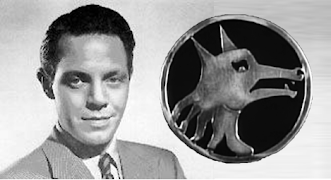 Lanyard is played, convincingly, by Louis Hayward, who projects the right mix of humanity (toward those he considers friends), menace (toward those who try to get in his way), and charm (toward the attractive stewardess, the attractive attendant at the counter, the attractive waitress, etc.). Stories often begin with Lanyard flying halfway around the world simply because a friend calls; along the way, he's subjected to many of the same pitfalls that frustrate private detectives everywhere: clients holding back the entire story, criminals who seem to be one step ahead, women who are as treacherous as they are attractive. He also suffers the same kind of physical punishment as his counterparts, those sucker punches from the guy hiding behind the door or the moll that conks him from behind when he isn't looking. And, of course, he'll even the score (and then some) before the episode's over. In fact, I'd say it's a toss-up as to who's the tougher between Lanyard and Cat (in this contest, the scribes from The Roaring 20s don't even stand a chance), but once Lanyard has the victim on the ropes, he'll beat him to a pulp (or what passes for pulp in the bloodless television of the '50s) until the police, or unconsciousness, intervenes. In it's own way, it's very satisfying.
Lanyard is played, convincingly, by Louis Hayward, who projects the right mix of humanity (toward those he considers friends), menace (toward those who try to get in his way), and charm (toward the attractive stewardess, the attractive attendant at the counter, the attractive waitress, etc.). Stories often begin with Lanyard flying halfway around the world simply because a friend calls; along the way, he's subjected to many of the same pitfalls that frustrate private detectives everywhere: clients holding back the entire story, criminals who seem to be one step ahead, women who are as treacherous as they are attractive. He also suffers the same kind of physical punishment as his counterparts, those sucker punches from the guy hiding behind the door or the moll that conks him from behind when he isn't looking. And, of course, he'll even the score (and then some) before the episode's over. In fact, I'd say it's a toss-up as to who's the tougher between Lanyard and Cat (in this contest, the scribes from The Roaring 20s don't even stand a chance), but once Lanyard has the victim on the ropes, he'll beat him to a pulp (or what passes for pulp in the bloodless television of the '50s) until the police, or unconsciousness, intervenes. In it's own way, it's very satisfying. So we have a dependable premise and an attractive hero. What we don't always have is a convincing story; sometimes the solution is too easy, or too obvious, or too rushed—that old half-hour constraint again, although I ought to add that 30 minutes is about the right length here, and keeps the action going at a tidy pace. And, like other programs from the early '50's it's always fun to see actors in supporting parts who go on to pretty successful careers: Ernest Borgnine, DeForest Kelley, Harry Morgan, Marjorie Lord, Barbara Billingsley, Beverly Garland, and more. All 39 episodes of the series are available on YouTube, and while it's not going to win any awards, it will keep you entertained for a half-hour, and make you wish you had someone like Mike Lanyard on your side. TV
Published on March 17, 2021 05:00
March 15, 2021
What's on TV? Wednesday, March 17, 1954

One of the more remarkable women in the history of television—one of the most remarkable people, really—makes multiple appearances in today's listing. Lee Phillip began on WBBM in 1952 with a 15-minute program; she would go on to host as many as five programs on the channel, including The Lee Philip Show, which would run from 1952 to 1986 (by next year, she would be commemorating her 2,500th show on WBBM); in her "spare" time, she and her husband created the CBS soap operas The Young and the Restless and The Bold and the Beautiful. In today's Chicagoland listings, she shows up at least three times; on her own show, as hostess of Shopping with Miss Lee at 4:00 p.m., and as the presenter of the 10:15 p.m weather, where "Miss Lee makes predictions." My prediction is you'll find something interesting in the shows below. ❷ WBBM (CBS)MORNING 7:00The Morning Show—Variety 8:00Ray Rayner—Comments 8:55News—Jim Conway 9:00Godfrey And Friends 10:30Strike It Rich—Quiz 11:00Valiant Lady—Serial 11:15Love Of Life—Serial 11:30Search For Tomorrow 11:45Guiding Light—Serial AFTERNOON 12:00Brighter Day—Serial 12:15Luncheon With Billy 12:25Lee Phillip Show—Tips 12:30Garry Moore—Variety 1:00Double or Nothing—Quiz 1:30Linkletter’s Houseparty 2:00Big Payoff—Quiz Game 2:30Bob Crosby—Musical 3:00Woman With A Past—Serial 3:15Secret Storm—Serial 3:30Petticoat Party—Games 4:00Shopping With Miss Lee 4:15MOVIE—“Headline Crasher” 5:00Garfield Goose and Friend 5:30Gene Autry Time—Film EVENING 6:00Sports—Bob Elson 6:15News—Julian Bentley 6:30News—Douglas Edwards 6:45Perry Como—Musical 7:00GODFREY AND FRIENDS 8:00STRIKE IT RICH—Quiz 8:30I’VE GOT A SECRET—PanelHenry Morgan, Jayne Meadows, Bill Cullen, Polly Bergen. Garry Moore emcees. 9:00BOXING—From ChicagoHarold Johnson vs. Paul Andrews, light-heavyweights 9:45SPORTS—Mel Allen 10:00NEWS—Fahey Flynn 10:15Weather—Lee Phillip 10:25Art Mercier—Sports Tips 10:30News—John Harrington 10:45Irv Kupcinet—Comments 11:00MOVIE—“East of Picadilly” 12:00MOVIE—“The World Owes Me a Living”
The midnight movie: the theme of every Gen Z today.
This week's story on Favorite Show: the theme of every TV news reporter today.
❼ WBKB (ABC) MORNING 7:00Chicago Parade—Variety 8:00Breakfast Club—Don McNeill 9:00News—Ulmer Turner 9:05Beulah Karney Presents 9:40Ed Allen—Exercise 9:55Weather—Wayne Griffin 10:00Play House—Kiddies 10:30Pied Pier Show—Kids 11:00Danny O’Neil—Variety 11:55News—Ulmer Turner AFTERNOON 12:00Happy Pirates—Kids’ Fun 12:55News—Ulmer Turner 1:00Ruth Crowley—Baby Care 1:15The Doctor’s Answer—Talk 1:30Swingalong—Musical 2:00Claude Kirchner—Variety 2:30Stuart Brent—Discussion 2:45News—Austin Kiplinger 3:00Jerry Lester Show—Variety 3:55Program Not Available 4:00News—Ulmer Turner 4:05MOVIE—“Submarine Base” 5:00Jolly Seven Gang—Kids 5:30Nick Francis—Films 5:45Bob And Ray—Satires EVENING 6:00News—Austin Kiplinger 6:05Sports—Jack Drees 6:10Weather—Wayne Grifin 6:15News—John Daly 6:30Mark Saber—Mystery 7:00MOVIE—Title Not Available 8:00TV THEATER—Film Drama“Top Kick” 8:30CITY DETECTIVE—Film 9:00WRESTLING—From Rainbo 10:00Double Date—Film Dramas 11:00News—Ulmer Turner 11:05Weather—Chuck Bill 11:10Commercial 11:15Tom Duggan—Comments 12:00MOVIE—“Buried Alive”
Scheduling Bob and Ray before the news: how do you tell when one ends and the other begins?
Contrary to popular belief, the anchor of the 5:30 news did not go on to work with James Bond.
TV
Published on March 15, 2021 05:00
March 13, 2021
This week in TV Guide: March 12, 1954
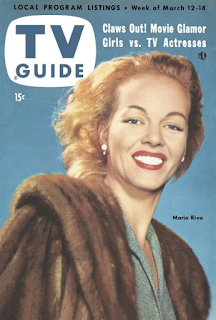 This week is kind of a mixed bag here at Retro TV Guide Headquarters, as we like to call it. (Well, OK, it's only me that calls it that, and just now is the first time I've ever done so, but let's think of it as literary license.) There's no one dominant topic, but a lot of smaller ones that, I think, adds up to a pretty good assortment.
This week is kind of a mixed bag here at Retro TV Guide Headquarters, as we like to call it. (Well, OK, it's only me that calls it that, and just now is the first time I've ever done so, but let's think of it as literary license.) There's no one dominant topic, but a lot of smaller ones that, I think, adds up to a pretty good assortment.And since St. Patrick's Day is this coming Wednesday, what better way to celebrate than with a toast to WGN-TV's up-and-coming young singer, an Irishman named Michael Delaney Dowd Jr., better known to one and all as Mike Douglas. He's recently been voted Chicago's favorite male singer in the TV Guide poll, no surprise since he's a familiar face on TV as as the host of WGN's Hi Ladies as well as one of the singers on DuMont's Music Show.
It's been a long road to this point for Douglas; he hit it big in 1945 as a guest on Strike it Rich, where he parlayed the song "Strange Music" (from the Broadway hit Song of Norway) into a stint as singer with Kay Kyser's band, which morphed into a role as the voice of Prince Charming in Disney's Cinderella, and a radio show heard over 500 stations nationwide. Following that was a tour with an old Kyser colleage, the comedian Ish Kabibble, as what was called "a poor man's Martin and Lewis." A friend of his who worked at WGN urged Douglas to audition for the station's show Luncheon Party. The station's general manager saw him, said "Sign him up!" and the rest is history.
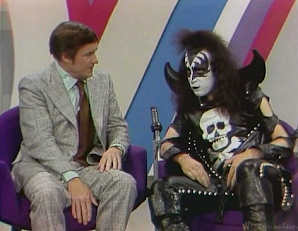 Mike Douglas and friendExcept it isn't, not yet. Douglas might have been riding high in 1954, but as rock and doo wop took over, his career, like so many crooners of the time, foundered. He moved to California, was house singer in a nightclub, toured from venue to venue; he and his wife flipped their home to make ends meet. And then the Douglas luck clicked again; in 1961, an old friend from those Chicago days hired him to host an afternoon talk-show host in Cleveland. His obituary in
The New York Times
tells the rest of the story: Within two years the show had branched out from Cleveland to other Group W stations in Boston, Baltimore, San Francisco and Pittsburgh. "By 1967 it was the most popular show on daytime television; the 14 minutes of commercials on the 90-minute show produced about $10 million annually for its creators." The show runs until 1981,* and Douglas lives happily in retirement until his death in 2006, on his birthday. And that is the rest of the history.
Mike Douglas and friendExcept it isn't, not yet. Douglas might have been riding high in 1954, but as rock and doo wop took over, his career, like so many crooners of the time, foundered. He moved to California, was house singer in a nightclub, toured from venue to venue; he and his wife flipped their home to make ends meet. And then the Douglas luck clicked again; in 1961, an old friend from those Chicago days hired him to host an afternoon talk-show host in Cleveland. His obituary in
The New York Times
tells the rest of the story: Within two years the show had branched out from Cleveland to other Group W stations in Boston, Baltimore, San Francisco and Pittsburgh. "By 1967 it was the most popular show on daytime television; the 14 minutes of commercials on the 90-minute show produced about $10 million annually for its creators." The show runs until 1981,* and Douglas lives happily in retirement until his death in 2006, on his birthday. And that is the rest of the history.*The show's longtime producer, Roger Ailes, first met Richard Nixon when Nixon appeared on the Douglas show in 1968; the rest of his story is history as well.
t t t
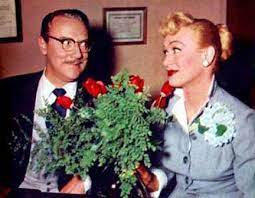 Now it's on a review of "The Program of the Week." and as regular "It's About TV" readers can attest, that frequently means a visit from your favorite critic and mine, Cleveland Amory. Of course, we're still a few years away from Cleve's weekly column, but even so, this week's Program of the Week is well worth checking out: the "rollicking TV comedy" Our Miss Brooks, starring Eve Arden as "America's No. 1 Schoolma'am."*
Now it's on a review of "The Program of the Week." and as regular "It's About TV" readers can attest, that frequently means a visit from your favorite critic and mine, Cleveland Amory. Of course, we're still a few years away from Cleve's weekly column, but even so, this week's Program of the Week is well worth checking out: the "rollicking TV comedy" Our Miss Brooks, starring Eve Arden as "America's No. 1 Schoolma'am."**I should also mention here that a reader took me to task a few months ago for ignoring Eve Arden when writing about an issue which featured her on the cover. I wasn't about to make that mistake again.
There's ample reason why Our Miss Brooks is such a hit, starting with Arden herself. Her "wry acceptance" of the various predicaments into which her students find themselves, combined with her own penchant for madcap antics, is a surefire combination that the viewing public finds irresistable on a weekly basis. And while Arden certainly has personal glamour in spades, she wisely plays down that aspect on TV, all the better to make more believable the increasingly unbelievable plotlines that the writers seem to cherish. It's true that the slapstick results in "a steady flow of laughs," but our unnamed critic suggests that toning it down a bit and making the people slightly more human and less caricaturish "could elevate this show into the sock category," which in Variety-speak means an even bigger hit.
Not to be lost in all this is Arden's excellent supporting cast, particularly Gale Gordon (above) as the pompous, often exasperated Principal Conklin, a precursor to his many, many years playing a similar foil to Lucille Ball. Bob Rockwell is "pleasant" as Mr. Boynton, the science teacher who remains the longtime object of Miss Brooks' affections, and Dick Crenna, as perpetual student Walter Denton, fits nicely into the slapstick nature of the show. Acknowledging that the show won't win any awards for intellectual content, it is nonetheless a "clever, funny" show, and Connie Brooks remains the high school teacher we all wish we had.
t t t
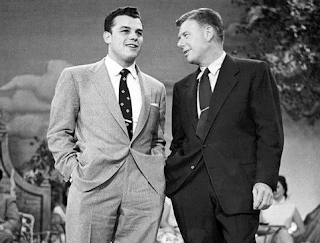 And now for one of my favorite sections, the TV Teletype, which as you know, comes to us from both New York and Hollywood.
And now for one of my favorite sections, the TV Teletype, which as you know, comes to us from both New York and Hollywood. October 19, 1953 was hardly a date that will live in infamy, at least not on the scale of Pearl Harbor, but it was certainly an important date for Arthur Godfrey and Julius LaRosa; it was on this date that the Old Redhead bounced LaRosa from his radio program for allegedly becoming too big for his britches. ("Lacked humility" was the key phrase, an iconic instance of the pot calling the kettle black.) With that as the backdrop, the New York Teletype notes that Arthur Godfrey and Friends has fallen out of the Top 10 for "the first time in months," with a corresponding drop of eight ratings points. Last month the show was sixth in the ratings; this month it sits at 15th. Teletype editor Bob Stahl cautiously notes that "it's probably too early to draw any conclusions," but five months after the fact, the handwriting is on the wall. Godfrey remains a force in American entertainment, but never with the level of popularity or success he had prior to firing LaRosa. It has to be, to this day, one of the most spectacular cases of self-immolation on record.
Also from the New York side of the Teletype, NBC's planning a blog of Saturday morning kids' programming this fall: "The kid lineup will start at 8 A.M. with a juvenile version of Dave Garroway's Today show." Funny; I thought that's what we have right now." On the Hollywood side of the aisle, Charlton Heston, frequent star on CBS's Studio One (they call him "Studio One's gift to the movies"), has a big role coming up on the big screen: he'll be playing Moses in The Ten Commandments. And in a sign of things to come, the pay-TV company Telemeter say that "their 148 Palm Springs subscribers are averaging $10 a month for pay-as-you-see new movies on TV." That adds up to nearly $100 a month today, which adds up to a lot of Netflix subscriptions.
t t t
So far we've spent our entire time looking at the stories at the beginning and end of the issue, and we haven't even touched the content in the middle, what a lot of you come here for: the programming itself. Time to rectify that, don't you think? We'll start with the most provocative program of the week.
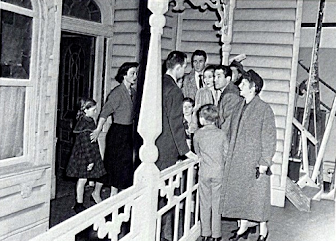 Monday night, the spotlight falls on Studio One's production of "Thunder on Sycamore Street," by Reginald Rose. (9:00 p.m,. CBS):
Monday night, the spotlight falls on Studio One's production of "Thunder on Sycamore Street," by Reginald Rose. (9:00 p.m,. CBS): "Neighbors attempt to run arespected citizen out of town when they learn that he is a former convict."
Now, anyone familiar with Rose's tendency to infuse his writing with a strong social justice message might read that description and suspect that there's more to the story than that—and they'd be right. In the story's original incarnation (based on an actual incident), the target of the vigilantes had been a black family moving into a white neighborhood. Not surprisingly, the network and sponsors demanded that the story be change. Rose complied, but subversely: until the play's end, the viewing audience would not be told why the family was being targeted; they would only know that neighbors were determined to run them out.
As Eric Barnouw describes it in Tube of Plenty, "This evasive strategy turned the play into an extraordinary social Rorschach test. Comments indicated that viewers filled in the missing information according to their own predilictions. Some at once assumed he was a communist; others, that he was a Puerto Rican, athiest, Jew, Catholic, Russian, or Oriental." The revelation that he was an ex-con was almost secondary to this social experiment. Concludes Barnouw, "The sponsors found, with some uneasiness, that they had presented precisely the kind of controversial drama they had tried to avoid." The drama received widespread praise, with Jack Gould of the Times describing it as, next to 1984, "as fine a work as Studio One has done this season."
Just think of how much more effective it might have been had TV Guide not spilled the beans in the description by telling you up front that the neighbor in question is an ex-con. Way to go, TV Guide; do you issue spoiler warnings with your subscriptions?
t t t
 Good day!What else? Well, since the start of TV Guide's television week is still Friday, we'll begin by looking in on the debut of an intriguing program with the intriguing title of Dilemma. (7:30 p.m. CT, WGN) The show, hosted by radio personality Paul Harvey (and created by Harvey's wife, Angel) presented a weekly "discussion on social problems." This week's panel consists of "Dr. Louis L. Mann of Mt. Sinai Temple, foremost leader of Reform Judaism; Dr. John Kane, head of the department of sociology at Notre Dame; Dr. Kenneth Hildebrand, minister of the Central Church of Chicago; and Dr Beryl Orris, expert in the fields of Inter-personal Relationships and Psychiatry." Now this is a show I'd like to know more about; did it air on DuMont, or was it strictly local? (Probably the latter.) How long did it run? What were the topics discussed each week? It's one of those shows about which you can't find very much information, except for this single line at the always-reliable Wikipedia, which describes Dilemma as "the [acknowledged] prototype of the modern talk show genre." Whether that's accurate or not, I don't know; the few articles that mention the show simply repeat the prototype assertion. What I do know is that I'd like to know more about it, and that's a dilemma of its own.
Good day!What else? Well, since the start of TV Guide's television week is still Friday, we'll begin by looking in on the debut of an intriguing program with the intriguing title of Dilemma. (7:30 p.m. CT, WGN) The show, hosted by radio personality Paul Harvey (and created by Harvey's wife, Angel) presented a weekly "discussion on social problems." This week's panel consists of "Dr. Louis L. Mann of Mt. Sinai Temple, foremost leader of Reform Judaism; Dr. John Kane, head of the department of sociology at Notre Dame; Dr. Kenneth Hildebrand, minister of the Central Church of Chicago; and Dr Beryl Orris, expert in the fields of Inter-personal Relationships and Psychiatry." Now this is a show I'd like to know more about; did it air on DuMont, or was it strictly local? (Probably the latter.) How long did it run? What were the topics discussed each week? It's one of those shows about which you can't find very much information, except for this single line at the always-reliable Wikipedia, which describes Dilemma as "the [acknowledged] prototype of the modern talk show genre." Whether that's accurate or not, I don't know; the few articles that mention the show simply repeat the prototype assertion. What I do know is that I'd like to know more about it, and that's a dilemma of its own.I've noticed that NBC Opera Theatre, which generally aired on Sundays throughout its run, was occasionally shown on Saturday in these early years (capitalizing on the popularity of the Metropolitan Opera Saturday matinee radio broadcasts?), and this Saturday 3:00 p.m. the presentation is a new opera, The Taming of the Shrew, by the American composer Vittorio Giannini. It's based, obviously, on Shakespeare's play, "with additional material from Romeo and Juliet and the Sonnets." What's particularly interesting is that the lead, Petruchio, is played by none other than actor and musical theater star John Raitt, father of Bonnie. (I've never considered Raitt as an operatic voice, although he was a very good singer.) It's a pity this opera isn't performed more; from what I can tell, this was only the third production (it debuted in 1953), and it received both popular and critical acclaim—Olin Downes, writing in the New York Times compared the opera favorably with Stravinsky’s The Rake’s Progress, high praise indeed.
Sunday means Ed Sullivan, of course, and on Toast of the Town (7:00 p.m., CBS), Ed welcomes pianist-comedian Victor Borge, Leslie Caron in a scene from Lili, Montgomery Clift, star of From Here to Eternity, dancer Hal Le Roy, Dorothy Hayden's Irish Steppers, Goodsmith Brothers dog act, dancer Peg Leg Bates, and—none other than the aforementioned Julius LaRosa! (and Godfrey really, really hated Sullivan for having LaRosa on so often.) Opposite Ed on NBC, it's the Colgate Comedy Hour, with Jimmy Durante as this week's host, joined by Eddie Cantor, Robert Montgomery, and opera star Patrice Munsel. Included in the festivities is Montgomery's dramatic narration of the history of Durante's theme song "Inka Dinka Doo," and Muncel's operatic treatment of it. I'll bet that was fun.
Monday also marks the debut of CBS's Morning Show (7:00 a.m.), the first in a long, long, long list of failed efforts by the network to unseat NBC's Today, a list that will come to include Jack Paar and Dick Van Dyke; for now, however, we'll be content with Walter Cronkite, Charles Collingwood, Frank Reynolds on the local news break, and the Baird Marionettes. Well, the morning isn't big enough for two chimps.
 Sounds like my kind of show, doesn't it?Tuesday night is TV's potpourri in a nutshelll: Bishop Sheen talks about "man and his role in the universe" on Life Is Worth Living (7:00 p.m., DuMont), Terry (Sherry Jackson) looks for a career as a child actress on Make Room for Daddy (8:00 p.m., NBC), Edward R. Murrow takes a look at the stories behind the headlines on See It Now (9:00 p.m., CBS), Fred Allen searches for today's talent on Judge For Yourself (9:00 p.m., NBC). and Robert Q. Lewis hosts the panel show The Name's the Same (9:30 p.m., ABC).
Sounds like my kind of show, doesn't it?Tuesday night is TV's potpourri in a nutshelll: Bishop Sheen talks about "man and his role in the universe" on Life Is Worth Living (7:00 p.m., DuMont), Terry (Sherry Jackson) looks for a career as a child actress on Make Room for Daddy (8:00 p.m., NBC), Edward R. Murrow takes a look at the stories behind the headlines on See It Now (9:00 p.m., CBS), Fred Allen searches for today's talent on Judge For Yourself (9:00 p.m., NBC). and Robert Q. Lewis hosts the panel show The Name's the Same (9:30 p.m., ABC). On Wednesday at 8:00 p.m., it's NBC's version of Kraft Theatre*, with "You Touched Me," a comedy written by Tennessee Williams and Donald Windham—and you'd have to figure that if it's a comedy, Williams would need a co-author. He was the theater's golden boy when this play hit Broadway in 1945, but according to the Times, "Every playwright is entitled to a slight fall from grace occasionally. "You Touched Me!" is Mr. Williams's." Ouch.
*Kraft sponsored two half-hour anthologies under the same name; in addition to NBC's Tuesday night version, another, completely different episode airs Thursday on ABC. Hey, it's the sponsor's money; they can do whatever they want.
Finally (and I'm never going to get used to the idea of Thursday as the end of the week—not until we start getting a three-day weekend all the time), a lot of people will be tuned in to You Bet Your Life (7:00 p.m., NBC) just to hear Groucho's witty repartee with contestants. But is it all as spontaneous as it seems? Not according to the ad for next week's issue, the ad for which reads: "Groucho Marx: Are His Ad-Libs For Real?" The answer, apparently, is no, but that's for another week; we've had just too much fun here.
t t t
OK, one more. Saturday's matinee movie on WNBQ (11:30 a.m.) is A Boy, a Girl and a Dog. I don't know what it's about, but if there's any justice in the world, it ought to start, "A boy, a girl and a dog walk into a bar". . . TV
Published on March 13, 2021 05:00
March 12, 2021
Around the dial

Last week, as you may recall, a dearth of new posts from the classic TV blogosphere resulted in an encore presentation of a particularly lame story about the cartoon mascot of a kids' breakfast cereal. I promised, however, to make up for it this week with plenty of interesting reading material including a couple of carryovers from last week, and I'm nothing if not a man of my word. And so, as Jackie Gleason might say, away we go!
One of those carryovers comes from The Horn Section, where Hal's F-Troop Fridays looks at "Wrongo Starr and the Lady in Black," a 1966 episode enlivened by the reappearance of Henry Gibson, funny as always as Private "Wrongo" Starr. And I hope you get the joke about Starr's name—or did you have to be there?
It's a doubleheader from Comfort TV; last week David shared the subversive plesure of watching Christmas shows after Christmas , which is something I admire but have never been able to do myself; and this week it's an arresting look at TV's top cops . (You like what I did there?) I have to pick Amos Burke over Barney Miller, though.
At bare-bones e-zine, Jack's latest Hitchcock Project continues with "The Avon Emeralds," the sixth contribution of William Fay, featuring Roger Moore as a detective who isn't quite what he seems. The Saint and stolen jewels; who could ask for anything more?
Hugh Downs had to be one of the most versatile performers, if that's the right word for him, in television history: announcer, sidekick, newsman, game show host, narrator, talk show host, and more. It's hard to give him his due , but Jodie does it at Garroway at Large.
You're never going to have to convince me to follow the links to a classic TV Guide, so I'd advise you to do the same as the Broadcast Archives at the University of Maryland steers us to some terrific vintage TV Guide ads from Chicago and beyond.
RealWeegieMidget has been hosting this year's Joan Collins Blogathon, which I wish I could have entered (maybe next year!); while you can read the final three entries here , follow the links and take some time to peruse them all. Meanwhile, at A Shroud of Thoughts, Terence offers his own entry; it's the winsome Joan in the Star Trek classic " The City on the Edge of Forever ." Quite a career, and quite an actress.
At Television's New Frontier: the 1960s, it's a review of the year 1962 for one of television's most enduring westerns, Wagon Train . The year includes the evolution of John McIntyre as successor to the late Ward Bond, the departure of longtime co-star Robert Horton, and a raft of big-name guests.
There are few simple pleasures more pleasurable than surfing through YouTube for episodes of old TV shows; I've shared more than a few of those here myself. At Television Obscurities, it's the start of a new monthly feature on YouTube finds , and I can promise you'll go down some rabbit holes with delight.
Finally, the veteran newsman Roger Mudd died this week at the age of 93 . Mudd was a newsman's newsman, a journalist who brought dignity and gravitas to whatever story he covered, and a professionalism that's sorely lacking in today's news coverage. Here's a look back at his career from his longtime home at CBS; we could certainly use someone like him today. I fear, though, it's a futile wish. TV
Published on March 12, 2021 05:00
March 10, 2021
The Descent into Hell: "The Obsolete Man" (1961)

What makes Romney Wordsworth, the hero of "The Obsolete Man" stand out from the heroes of 1984 and Darkness at Noon is, I think, his humanity. Those two stories are very much contests of ideas and ideologies, and while the human toll can't be ignored, one still comes to the end of each story experiencing a sense of futility, of the individual being crushed.
Not so with Rod Serling's disturbing Twilight Zone episode, which originally aired on June 2, 1961. Now, it's true that Wordsworth, like his counterpart Rubashov from Darkness at Noon, is ultimately executed by the masters of the totalitarian government that rules over his society. Wordsworth's death in a bomb blast is far more explicit, though, than is the case with Rubashov, who is being led to the executioner as the story comes to an end. (Winston Smith, the protagonist of 1984, suffers a more existential fate; while his body survives, it is is soul that dies.)
But while Rubashov may conclude that he deserves death for his crimes in the name of the revolution, and Smith may be too far gone to realize anything, Wordsworth meets his fate with glorious, even joyful, defiance. It's not that he yearns for death; I think he appreciates life as much as anyone. The difference, though, is that he doesn't fear death; and, as the Chancellor will discover, that makes for a huge difference.
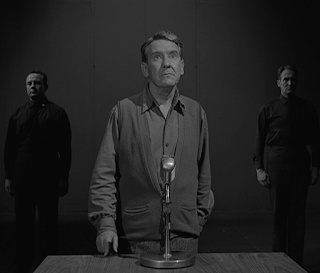 As the story opens, we're introduced to a society in which both books and religion have been outlawed. Wordsworth (played brilliantly by Burgess Meredith) is summoned to face the Chancellor (played malevolently by Fritz Weaver)*, who presides over a magnificently expressionist courtroom, standing behind a podium designed to make any human look insignificent by comparison. The subaltern reads the charges against Wordsworth*; he has spent his life as a librarian, and he believes in God. He is, therefore, an obsolete man. The sentence: death.
As the story opens, we're introduced to a society in which both books and religion have been outlawed. Wordsworth (played brilliantly by Burgess Meredith) is summoned to face the Chancellor (played malevolently by Fritz Weaver)*, who presides over a magnificently expressionist courtroom, standing behind a podium designed to make any human look insignificent by comparison. The subaltern reads the charges against Wordsworth*; he has spent his life as a librarian, and he believes in God. He is, therefore, an obsolete man. The sentence: death.*The tone of voice used by the subaltern as he reads the charges was a harsh monotone that, according to director Elliot Silverstein, was modeled after the speaking voice of Senator Joseph McCarthy.
Let it not be said, however, that this enlightened State lacks compassion. Wordsworth is given a choice as to how he will die. His choice: he will die in his library at home, with the execution to be broadcast live on television, a decision that meets with the Chancellor's approval ("It has an educative effect on the population.") That's the where; the how is to be a secret between Wordsworth and his executioner. As the Chancellor will soon discover, though, the smallest act of individuality, the most insignificant expression of freedom, can prove fatal to a regime built upon control.
With an hour left to live, Wordsworth has invited the Chancellor to join him in his study, an invitation which the Chancellor accepts despite the obvious risks involved; as he points out to Wordsworth, he does so "to prove to you that the state has no fears, none at all." Then he springs his surprise on the Chancellor, his choice of execution: a bomb, set to explode at midnight. Oh, and by the way, the door to the study is locked and Wordsworth has the key, which means the Chancellor will die with him. Death, Wordsworth says, "the great equalizer" that rich and poor, powerful and weak, all must face, with nothing to distinguish them. For a time the Chancellor puts on a brave front, but he knows there will be no rescue party from the state: "the act of rescue would be very demeaning to them." When he cracks, it's a doozy: "In the name of God, let me out!" "Yes, Chancellor," Wordsworth replies quietly, "in the name of God, I will let you out." Proving, once again, that there are no athiests in foxholes."
As the Chancellor returns to the courtroom, he finds that the subaltern, who once sat at the foot of the podium, now occupies the seat of power. His show of weakness, of appealing in the name of God, has disgraced the state. "you therefore have no function. You are obsolete." In the end, the mob turns on him and tears him to shreds, the revolution consuming its own.
S02 E29 The Obsolete Man.mp4 from Alex Willson on Vimeo.
t t t
We're never given a glimpse of life under the regime, whether its citizens are beaten, tortured, starved, herded like cattle. We only see the rigidity of the law: harsh, oppressive, unforgiving, absolute. For all we know, intimidation and fear alone are sufficient to maintain such total control over the populace. After all, those kinds of tactics don't leave any any marks. Outwardly.
But when you think about it, it's not really necessary for the state to resort to such brutality in order to maintain societal order; as a matter of fact, it's really much easier than "The Obsolete Man" makes it appear. Take religion, for instance. There's no need to actually ban it; all it takes is a few well-chosen words: talk about how judgemental, how exclusionary, how hateful it is, how it can create divided loyalties, breed an attitude of defiance, distract from the goals of the state—an institution, mind you, dedicated to preserving the rights of every citizen, not just a select few who refuse to go along with what is best for the whole. You don't have to abolish it: just use shame to make sure it no longer has a place in the public square.
All it takes is the right word whispered in the right ear, the right accusation shouted by the mob in the streets. There's no need to resort to firement to burn books. After all, everyone knows that there are some things just too dangerous, too inflamatory, to appear in print, or online. People can't be allowed to fall victim to falsehoods, disinformation, fake news; it might contradict the advice of the state's experts, and after all, it's the state that knows what is best for the masses. No, it's best to protect the public from such ignorant ideas. And so, just a little pressure applied in the right places. and voila! Publishers will refuse to print such degenerate information, and bookstores will refuse to carry it. You might be able to find it somewhere, wrapped in a brown paper bag.
And the best part of it is, if you play your cards right, the people will do all the dirty work for you. I mean, think about it. Why bother with the messy threat of jail to keep people in line—I mean, to preserve a peaceful society. No, you just make sure to understand the inherent vunerabilities of people. Nobody wants to lose their job or have their business closed, iust because of something they said or did when they were young; no one wants to risk having their credit lowered or find themselves unable to buy or rent a home, based on a candidate they supported for public office.
Most important, nobody wants to face social ostracism, to have the people you thought were your friends turn their back on you to be airbrushed right out of the scene. All it takes is a little cooperation from the public, and that's no problem when you've built a network of informers out of your true believers, the ones with the right pedigree and education, the ones who understand what the threat is, whether it's spreading false information—that is, something contrary to the official line—or an act of manifest disobediance, such as going out in public without a mask. It doesn't matter if it's the unnamed state of "The Obsolete Man" or an organization such as the Chinese Communist Party, or one that goes under a made-up name—oh, I don't know, let's just say something like Antifa.
Pretty soon, after a little of this, people will learn to censor themselves. You might call it being cowed into submission; others might see it as people learning to act in their own self-interest. Isn't that what we all do anyway?
And who's to say that the people aren't fine with that?
t t t
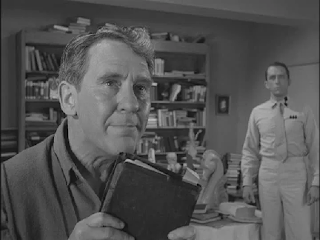 The ultimate triumph of Romney Wordsworth—yes, triumph—is that he demonstrates, for one and all to see, that the authority of the state sits upon a foundation of sand. "No man is obsolete," Wordsworth says at his trial, and it is true; no human being can be obsolete as long as he maintains his humanity; it is what gives him life.
The ultimate triumph of Romney Wordsworth—yes, triumph—is that he demonstrates, for one and all to see, that the authority of the state sits upon a foundation of sand. "No man is obsolete," Wordsworth says at his trial, and it is true; no human being can be obsolete as long as he maintains his humanity; it is what gives him life.As Wordsworth and the Chancellor await the bomb blast, with the former increasingly serene and the latter increasingly frantic, Wordsworth reads from his forbidden Bible, and the state is exposed once and for all as a paper tiger. "The Lord is my shepherd, I shall not want," he quotes from the 23rd Psalm, but he could just as easily have been reading from the prayer for the dead, which asserts that "in death life is changed, not ended."
He goes to his execution, not "cringing and pleading," as the Chancellor had predicted, "the end of a rather fruitless life." No, by facing death with such confidence and, dare I say it again, joy, he denies the state its ultimate victory. You do not control me, Wordsworth says through his words and his actions. I refuse to bend to your will. I refuse to live in fear. It is, in fact, the Chancellor who, in the face of death, cringes and pleads for his life—first, when he begs Wordsworth to let him go "in the name of God," and second, when he finds that he has himself been declared obsolete. Like Rubashov in Darkness at Noon, his appeals are based on his past history with the state. "I've worked for the state. I've helped the state. I helped give the state strength." Ironic, isn't it, that it is the state that has declared that "history teaches you nothing."
Wordsworth's act of defiance proves that his death, and therefore his life, has not been meaningless. He has exposed a crack in the State, the first crack perhaps, but anyone observing how a crack in a cement sidewalk expands and spreads over time can predict how it will all end. Not, perhaps, in the lifetime of the new Chancellor; not even, perhaps, during the lifetimes of anyone in the story. Nevertheless, it will happen.
It is often said that only a fool fears nothing; it is fear that triggers the necessary instinct for survival. So it is with any government as well; a state that does not know fear issues an open invitation for it's own downfall. As Serling wrote for his concluding narration, "Any state, any entity, any ideology which fails to recognize the worth, the dignity, the rights of Man...that state is obsolete."
And that final lesson of Romney Wordsworth's death, the one that most becomes his life, can be found in that book he holds in his hands, where the apostle Paul rhetorically asks the Corinthians, "Death, where is thy sting?" For to fear death is to fear life, and to fear life one might as well be dead. There's another line that Rod Serling wrote for his conclusion, one that wasn't used but sums up the lesson of "The Obsolete Man" quite well. "Any state, entity, or ideology becomes obsolete when it stockpiles the wrong weapons: when it captures territories, but not minds; when it enslaves millions, but convinces nobody. When it is naked, yet puts on armor and calls it faith, while in the Eyes of God it has no faith at all." Just as tyranny is timeless, so is truth. TV
Published on March 10, 2021 05:00
March 8, 2021
What's on TV: Saturday, March 8, 1980

This is one of those days that reminds me how problematic television in 1980s is. Now, I don't want to step on anyone's toes (and if you saw the size of my shoes, you wouldn't want me to, either), but look at some of these morning cartoons: The Godzilla/Globetrotters Adventure Hour? Fred and Barney Meet the Shmoo? The Plastic Man Comedy/Adventure Show? Has Plastic Man even made it to the movies yet? Primetime isn't much better, considering the forgettable lineups for CBS and NBC; I suspect it's mostly due to the dominance of ABC's Saturday night lineup, particularly The Love Boat and Fantasy Island. CBS alone would have seven different Saturday night schedules during the season, while NBC had five. How many of you remember Hagen, a legal drama starring Chad Everett? Look fast; it was only on for seven weeks. The Chisholms started out as a miniseries in 1979, and worked its way into the Saturday night lineup; it will soon be replaced by The Tim Conway Show. And Tom Snyder's Prime Time Saturday apparently wasn't ready for prime time, was it? At least we're ready with the listings, this week from the New Hampshire Edition—which, you'll notice, consists mostly of stations in Boston and Portland. As I alluded to on Saturday, it's a complicated market.
-2- WGBH (BOSTON) (PBS) MORNING 8:00 SESAME STREET—Children 9:00 MISTER ROGERS’ NEIGHBORHOOD—Children 9:30 ZOOM—Children 10:00 SESAME STREET—Children 11:00 3-2-1 CONTACT—Children 11:30 HAROLD LLOYD’S WORLD OF COMEDY—Documentary AFTERNOON 12:00 WASHINGTON WEEK IN REVIEW 12:30 WORLD WAR II: G.I. DIARY 1:00 OVER EASY—Hugh Downs Guest: Molly Picon 1:30 OVER EASY—Hugh Downs Guest: Patti Page 2:00 OVER EASY—Hugh Downs Guest: Jose Greco 2:30 OVER EASY—Hugh Downs Guest: Edie Adams 3:00 OVER EASY—Hugh Downs Guest: Phyllis Diller 3:30 KUP’S SHOW 4:30 AUSTIN CITY LIMITS Guest: Ray Charles 5:30 AS WE SEE IT EVENING 6:00 LA PLAZA—Raquel Ortiz 6:30 ELLIOT NORTON REVIEWS—Discussion 7:00 SNEAK PREVIEWS Included: “The Black Marble” 7:30 NATIONAL GEOGRAPHIC Special: “The Invisible World” 8:45 FRED ASTAIRE: PUTTIN’ ON HIS TOP HAT Special 9:45 MOVIE—Musical “In the Good Old Summertime” (1949)
-4- WBZ (BOSTON) (NBC) MORNING 6:00 INTERNATIONAL ZONE—Documentary 6:30 CARRASCOLENDAS—Children 7:00 MUNDO REAL 7:30 FOR KIDS ONLY—Ron Robin 8:00 GODZILLA, GLOBETROTTERS—Cartoon 9:00 FRED AND BARNEY MEET THE SHMOO—Cartoon 10:30 DAFFY DUCK—Cartoon 11:00 GET OFF YOUR BLOCK—Children 11:30 NEWS AFTERNOON 12:00 HOT HERO SANDWICH—Children 1:00 MARLO AND THE MAGIC MOVIE MACHINE—Children 1:30 NCAA BASKETBALL Special: Second-round game 3:45 NCAA BASKETBALL Special: Second-round game 5:45 NCAA BASKETBALL WRAP-UP EVENING 6:00 NEWS 6:30 NBC NEWS—Jane Pauley 7:00 GUINNESS GAME 7:30 HOLLYWOOD SQUARES—Game 8:00 CHiPs—Crime Drama 9:00 BJ AND THE BEAR 10:00 PRIME TIME SATURDAY—Tom Snyder 11:00 NEWS 11:30 SATURDAY NIGHT LIVE Host: Rodney Dangerfield. Guest: J. Geils Band 1:00 DON KIRSHNER’S ROCK CONCERT KISS, Gloria Gaynor, New England, Roger & Roger 2:30 MOVIE—Comedy “The Monte Carlo Story” (Italian; 1957) 4:30 MOVIE—Drama BW “Woman and the Hunter” (1957)
-5- WCVB (BOSTON) (ABC) MORNING 6:00 BETTER WAY—Consumer Report 6:30 JABBERWOCKY—Children 7:00 BARBAPAPA—Cartoon 7:30 CAPTAIN BOB—Children 8:00 WORLD’S GREATEST SUPERFRIENDS—Cartoon 9:00 PLASTIC MAN—Cartoons 10:30 SCOOBY AND SCRAPY-DOO—Cartoons 11:30 KIDSWORLD—Children AFTERNOON 12:00 CANDLEPIN BOWLING 1:00 CANDLEPIN SUPERBOWL 3:30 PRO BOWLING Fair Lanes Open, Washington, D.C. 5:00 WIDE WORLD OF SPORTS Boxing: Earnie Shaves vs. Bernrdo Mercado; speed skating; gymnastics; downhill skiing EVENING 6:30 NEWS 7:00 LAWRENCE WELK 8:00 ONE IN A MILLION—Comedy 8:30 ROPERS 9:00 LOVE BOAT 10:00 FANTASY ISLAND 11:00 NEWS 11:30 MOVIE—Comedy BW “The Shop Around the Corner” (1940) 1:30 FIVE ALL NIGHT/LIVE ALL NIGHT—Matt Siegel Guest: Taj Mahal 3:30 ABC NEWS 3:45 WANTED: DEAD OR ALIVE BW 4:15 FIVE ALL NIGHT 4:30 GOOD DAY! Guests: The Ink Spots
-6- WCSH (PORTLAND) (NBC) MORNING 6:35 NEWS EXTRA 6:45 NEWS 7:00 AG-USA 7:30 KIDSWORLD—Children 8:00 GODZILLA, GLOBETROTTERS—Cartoon 9:00 FRED AND BARNEY MEET THE SHMOO—Cartoon 10:30 DAFFY DUCK—Cartoon 11:00 CASPER AND THE ANGELS—Cartoon 11:30 JETSONS—Cartoon AFTERNOON 12:00 EMERGENCY ONE!—Drama 1:00 YOUNG MATADOR—Motorcycle Racing 1:30 NCAA BASKETBALL Special: Second-round game 3:45 NCAA BASKETBALL Special: Second-round game 5:45 NCAA BASKETBALL WRAP-UP EVENING 6:00 NEWS 6:30 NBC NEWS—Jane Pauley 7:00 MUPPET SHOW—Variety Guests: Mark Hamill, R2-D2, C-3PO 7:30 DANCE FEVER Judges: Mimi Kennedy, Ron Palillo, Gavin MacLeod. Host: Deney Terrio 8:00 CHiPs—Crime Drama 9:00 BJ AND THE BEAR 10:00 PRIME TIME SATURDAY—Tom Snyder 11:00 NEWS 11:30 SATURDAY NIGHT LIVE Host: Rodney Dangerfield. Guest: J. Geils Band 1:00 MOVIE—Musical BW “Hallelujah, I’m a Bum” (1933)
-7- WNAC (BOSTON) (CBS) MORNING 6:25 GREATER BOSTONIANS—Music 6:30 SUNRISE SEMESTER Learning to Write/Writing to Learn 7:00 REBOP—Children 7:30 VEGETABLE SOUP—Children 8:00 MIGHTY MOUSE/HECKLE AND JECKLE—Cartoons 9:00 BUGS BUNNY/ROAD RUNNER—Cartoons 10:30 POPEYE—Cartoons 11:30 FAT ALBERT—Cartoon AFTERNOON 12:00 SHAZAM!—Children 12:30 SUPER 7—Cartoons 1:30 30 MINUTES 2:00 UP FRONT—Ted O’Brien 2:30 JOKER! JOKER!! JOKER!!!—Game 3:00 STREETS OF SAN FRANCISCO—Crime Drama 4:00 SPORTS SPECTACULAR Boxing: Leon Spinks vs. Eddie Lopez; Men’s World Speed Skating Championships 5:00 GOLF Special: Jackie Gleason Inverrary Classic, third rond EVENING 6:00 NEWS 6:30 BLACK NEWS 7:00 DANCE FEVER Judges: Eva Gabor, Gower Champion, David Hodo. Deney Terrio is the host. 7:30 SHA NA NA—Variety 8:00 CHISHOLMS—Western 9:00 HAWAII FIVE-O—Crime Drama 10:00 HAGEN—Drama 11:00 NEWS 11:30 SOUTH CAROLINA PRIMARY Special 12:00 MOVIE—Adventure “Man in the Wilderness” (1971) 2:00 MOVIE—Comedy BW “I Was a Male War Bride” (1949) 3:30 NEWS 4:00 GREATER BOSTONIANS—Music
-8- WMTW (POLAND SPRING) (ABC) MORNING 6:00 NEW YOU—Health 7:00 TO BE ANNOUNCED 7:30 KROFFT SUPERSTARS—Children 8:00 WORLD’S GREATEST SUPERFRIENDS—Cartoon 9:00 PLASTIC MAN—Cartoons 10:30 SCOOBY AND SCRAPY-DOO—Cartoons 11:30 CAPTAIN CAVEMAN AND THE TEEN ANGELS—Cartoon AFTERNOON 12:00 WEEKEND SPECIAL 12:30 AMERICA’S ATHLETES—1980 2:00 AUTO RACING International Race of Champions 2:45 AMERICAN SPORTSMAN 3:30 PRO BOWLING Fair Lanes Open, Washington, D.C. 5:00 WIDE WORLD OF SPORTS Boxing: Earnie Shaves vs. Bernrdo Mercado; speed skating; gymnastics; downhill skiing EVENING 6:30 HIGH SCHOOL QUIZ Windham Vs. South Windham 7:00 LAWRENCE WELK 8:00 ONE IN A MILLION—Comedy 8:30 ROPERS 9:00 LOVE BOAT 10:00 FANTASY ISLAND 11:00 ABC NEWS 11:15 MOVIE—Drama BW “The Sweet Sound of Death” (Spanish; 1965)
-9- WMUR (MANCHESTER) (ABC) MORNING 8:00 WORLD’S GREATEST SUPERFRIENDS—Cartoon 9:00 PLASTIC MAN—Cartoons 10:30 SCOOBY AND SCRAPY-DOO—Cartoons 11:30 CAPTAIN CAVEMAN AND THE TEEN ANGELS—Cartoon AFTERNOON 12:00 WEEKEND SPECIAL 12:30 AMERICAN BANDSTAND Guests: Bonnie Pointer, the Beat 2:00 AUTO RACING International Race of Champions 2:45 AMERICAN SPORTSMAN 3:30 PRO BOWLING Fair Lanes Open, Washington, D.C. 5:00 WIDE WORLD OF SPORTS Boxing: Earnie Shaves vs. Bernrdo Mercado; speed skating; gymnastics; downhill skiing EVENING 6:30 THRILLSEEKERS 7:00 HEE HAW Guests: Dennis Weaver, Dottsy, Randy Boone, Woody Woodbury 8:00 ONE IN A MILLION—Comedy 8:30 ROPERS 9:00 LOVE BOAT 10:00 FANTASY ISLAND 11:00 ABC NEWS 11:15 MOVIE—Drama “The Picture of Dorian Gray” (1945)
11 WENH (DURHAM) (PBS) MORNING 8:00 SESAME STREET—Children 9:00 MISTER ROGERS’ NEIGHBORHOOD—Children 9:30 ONCE UPON A CLASSIC—Children 10:00 WILD, WILD WORLD OF ANIMALS 10:30 VOYAGE OF CHARLES DARWIN—Drama 11:30 FOOTSTEPS AFTERNOON 12:00 GROWING YEARS—Instruction 12:30 JULIA CHILD AND MORE COMPANY 1:00 AMERICANS—Documentary 2:00 NOVA 3:00 MOVIE—Adventure BW “Captain Kidd” (1945) 4:40 MOVIE—Biography BW “Pride of the Yankees” (1942) EVENING 7:00 SPEAKING OF LOVE: LEO BUSCAGLIA—Lecture 8:00 SONGS OF A LUSTY LAND Special: Host Tennessee Ernie Ford, Merle Haggard, Kay Starr, Tom T. Hall, Linda Hopkins, the Sons of the Pioneers 10:00 MOVIE—Musical “Can-Can” (1960)
12 WMEB (ORONO) (PBS) MORNING 8:00 SESAME STREET—Children 9:00 MISTER ROGERS’ NEIGHBORHOOD—Children 9:30 ONCE UPON A CLASSIC—Children 10:00 AS WE SEE IT 10:30 FREE TO CHOOSE—Economics 11:30 NOVA AFTERNOON 12:40 WOODS AND WATERS 1:15 ALL CREATURES GREAT AND SMALL—Drama 2:10 BOGART—Profile 3:15 MOVIE—Drama BW “Dead End” (1937) 5:00 LEGIS*STATE 5:30 TO NORWAY: HOME OF GIANTS—Comedy Host: Norman Fearless (John Cleese) EVENING 6:00 FOOTSTEPS 6:30 ANOTHER VOICE—Interview 7:00 ONCE UPON A CLASSIC 7:30 AGRONSKY AND COMPANY--Discussion 8:00 SONGS OF A LUSTY LAND Special: Host Tennessee Ernie Ford, Merle Haggard, Kay Starr, Tom T. Hall, Linda Hopkins, the Sons of the Pioneers 10:00 MOVIE—Musical “Can-Can” (1960)
13 WGAN (PORTLAND) (CBS) MORNING 6:00 MAINE WEATHER 6:30 SUNRISE SEMESTER Learning to Write/Writing to Learn 7:00 MARIO AND THE MAGIC MOVIE MACHINE—Children 7:30 COURTSHIP OF EDDIE’S FATHER—Comedy-Drama 8:00 MIGHTY MOUSE/HECKLE AND JECKLE—Cartoons 9:00 BUGS BUNNY/ROAD RUNNER—Cartoons 10:30 POPEYE—Cartoons 11:30 FAT ALBERT—Cartoon AFTERNOON 12:00 SHAZAM!—Children 12:30 SUPER 7—Cartoons 1:30 30 MINUTES 2:00 WRESTLING 3:00 IRONSIDE—Crime Drama 4:00 NORM CROSBY’S THE COMEDY SHOP Guests: Jim Brown, Corbett Monica, Roberta Kent 4:30 SPORTS SPECTACULAR Boxing: Leon Spinks vs. Eddie Lopez; Men’s World Speed Skating Championships [Joined in progress.] 5:00 GOLF Special: Jackie Gleason Inverrary Classic, third rond EVENING 6:00 NEWS 6:30 CBS NEWS—Bob Schieffer 7:00 HEE HAW Guests: Dennis Weaver, Dottsy, Randy Boone, Woody Woodbury 8:00 CHISHOLMS—Western 9:00 HAWAII FIVE-O—Crime Drama 10:00 HAGEN—Drama 11:00 NEWS 11:30 SOUTH CAROLINA PRIMARY Special 12:00 MOVIE—Comedy “Move” (1970)
31 WNNE (HANOVER) (NBC) MORNING 7:30 BAY CITY ROLLERS—Cartoon 8:00 GODZILLA, GLOBETROTTERS—Cartoon 9:00 FRED AND BARNEY MEET THE SHMOO—Cartoon 10:30 DAFFY DUCK—Cartoon 11:00 CASPER AND THE ANGELS—Cartoon 11:30 JETSONS—Cartoon AFTERNOON 1:00 NCAA BASKETBALL SPECIAL Special 1:30 NCAA BASKETBALL Special: Second-round game 3:45 NCAA BASKETBALL Special: Second-round game 5:45 NCAA BASKETBALL WRAP-UP EVENING 6:00 SHA NA NA—Variety Guest: Freddy Fender 6:30 NBC NEWS—Jane Pauley 7:00 AMERICA’S ATHLETES—1980 8:00 CHiPs—Crime Drama 9:00 BJ AND THE BEAR 10:00 PRIME TIME SATURDAY—Tom Snyder 11:00 PORTER WAGONER—Music 11:30 SATURDAY NIGHT LIVE Host: Rodney Dangerfield. Guest: J. Geils Band
38 WSBK (BOSTON) (Ind.) MORNING 6:00 HAZEL—Comedy 6:30 HAZEL—Comedy 7:00 TENNIS Peter Fleming vs. Tim Gullickson 8:00 FAITH FOR TODAY 8:30 VIEWPOINT ON NUTRITION 9:00 VILLA ALEGRE—Children 9:30 CARRASCOLENDAS—Children 10:00 HOT FUDGE—Children 10:30 MOVIE—Comedy BW “Blondie’s Big Deal” (1949) AFTERNOON 12:00 MOVIE—Comedy BW “High Society” (1955) 2:30 MOVIE—Mystery BW “Sherlock Holmes and the Scarlet Claw” (1944) 4:00 MOVIE—Drama “The Adding Machine” (English; 1969) EVENING 6:00 WILD, WILD WEST—Adventure 7:00 FAMILY FEUD—Game 7:30 FAMILY FEUD—Game 8:00 NHL HOCKEY Boston Bruins at New York Islanders 10:30 BRUINS WRAP-UP 11:00 SECOND CITY TELEVISION—Comedy 11:30 MOVIE—Mystery BW “Charlie Chan at the Wax Museum” (1940) 1:00 ROCKWORLD—Music Guests: Jethro Tull, U-Roy 1:30 MOVIE—Mystery BW “The Hound of the Baskervilles” (1939) 3:00 MOVIE—Adventure BW “The Jungle” (1952) 4:15 MOVIE—Drama BW “Heat Wave” (English; 1954) 5:30 MOVIE—Comedy BW “It Had to Be You” (1947)
44 WGBX (BOSTON) (PBS) AFTERNOON 5:00 QUE PASA, U.S.A.? 5:30 INDIAN ART EVENING 6:00 SESAME STREET—Children 7:00 ONCE UPON A CLASSIC 7:30 DIAMOND RIVERS—Documentary 8:00 SONGS OF A LUSTY LAND Special: Host Tennessee Ernie Ford, Merle Haggard, Kay Starr, Tom T. Hall, Linda Hopkins, the Sons of the Pioneers 9:50 THAT GREAT AMERICAN GOSPEL SOUND—Music Tennessee Ernie Ford, Della Reese, the Jordanaires, the Happy Goodman Family, Micki Fuhrman, the Fisk Jubilee Singers
56 WLVI (BOSTON) (Ind.) MORNING 8:30 MUSIC AND THE SPOKEN WORD—Religion 9:00 ORAL ROBERTS—Religion 9:30 JIMMY SWAGGART—Religion 10:30 DE TODO UN POCO—In Spanish 11:00 WRESTLING AFTERNOON 12:00 THEN CAME BRONSON—Drama 1:00 MOVIE—Thriller BW “Monster on the Campus” (1958) 2:30 MOVIE—Thriller BW “The Thing That Couldn’t Die” (1958) 4:00 MOVIE—Western “The Savage” (1953) EVENING 6:00 HAPPY DAYS AGAIN—Comedy 6:30 SANFORD AND SON—Comedy 7:00 STAR TREK—Science Fiction 8:00 MOVIE—Biography BW “The Joker is Wild” (1957) 10:30 ROALD DAHL’S TALES OF THE UNEXPECTED 11:00 NORM CROSBY’S THE COMEDY SHOP 11:30 MOVIE—Thriller “The Pit and the Pendulum” (1961)
TV
Published on March 08, 2021 05:00
March 6, 2021
This week in TV Guide: March 8, 1980
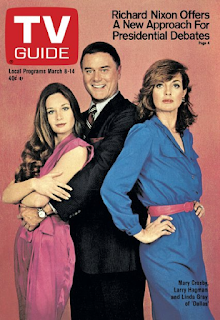 And you thought that your TV set was only good for watching TV shows. Silly you! This week Tom Zito takes a look, 1980s-style, at how a television can work with a home computer to do a whole variety of things: play video games, do your income tax, or learn a foreign language. It's all thanks to "preprogrammed personal computers" that invaded our stores last Christmas, and it has the potential to turn your TV screen into "the standard display unit for a thinking, speaking, remembering, interactive electronic brain that makes the computer Hal in the film 2001 seem not so far-fetched after all."
And you thought that your TV set was only good for watching TV shows. Silly you! This week Tom Zito takes a look, 1980s-style, at how a television can work with a home computer to do a whole variety of things: play video games, do your income tax, or learn a foreign language. It's all thanks to "preprogrammed personal computers" that invaded our stores last Christmas, and it has the potential to turn your TV screen into "the standard display unit for a thinking, speaking, remembering, interactive electronic brain that makes the computer Hal in the film 2001 seem not so far-fetched after all."The new age of personal computing, and the simplicity with which they work (just pop in the right cartridge!) could make them, Zito thinks, "as popular as food processors and pocket calculators." Last year, Radio Shack sold 100,000 home computers that required programming, and California's Apple Computer sold $100 million worth of programmable units. The game changer, though, came when Mattel, Atari and Texas Instruments introduced computers that had already been preprogrammed, which "eliminated the onerous task of keyboarding a program into the system"
To demonstrate the possibilities, Zito describes the baseball fan settling down for a game, even in the middle of December. "Hook the $280 Mattel Intellivision unit up to the TV antenna, slip in the $30 baseball cartridge and the home team runs out of the dugout. The pitcher warms up and the players toss the ball around the inflied. The solid smack of ash meeting cowhide sounds as the first batter connects with the ball and hustles down to first, where an electronic ump rules on the play--shouting 'You're out!' if appropriate" (An Xbox or PlayStation, with less sophisticated graphics!)
"We purposely avoided calling our system a computer," explains Mattel's Jeff Rochlis. "That's been a word with negative connotations. This is a device that will entertain the kids and be a learning aid." In other words, a computer. While some of the systems interface with the television screen ("We laready see some conflict with TV viewing in our consumer testing," Rochlis says), TI and Radio Shack use separat monitors; the resolution is better, but you can't watch TV through them. Telephone-interface devices are available (for between $200 and $390) to allow users to connect with other computers and databases, and disc drives, which increase memory, are available for between $500 and $700.
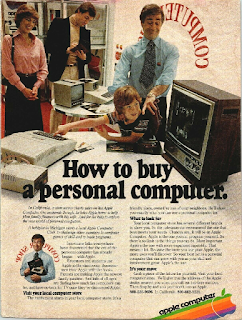 The sky's the limit, according to Apple's Phil Roybal. "What we can do now is staggering to most people. And yet the home computer is in its infancy." Creativity, he says, is what will make people buy computers. "They'll be astounded at what they can do right at home on their TV screen, and that may give broadcast television a good run for the money."
The sky's the limit, according to Apple's Phil Roybal. "What we can do now is staggering to most people. And yet the home computer is in its infancy." Creativity, he says, is what will make people buy computers. "They'll be astounded at what they can do right at home on their TV screen, and that may give broadcast television a good run for the money."This is, in a way, a seminal cultural moment. We’re beginning to see the displacement of television as the primary mode of household entertainment—more specifically, we’re seeing live television programming become less important. It will continue to mount: people use their televisions to play video games, to watch recorded programs, to watch cable programs, to cut the cord and watch programs on-demand. Eventually, we'll see computers—including our phones—come to equal, if not surpass, television as a visual source of entertainment: we play the games, we watch the shows, we do our shopping.
I'm not sure what Phil Roybal might have been anticipating, but "astounded" is a pretty good word for what's come to pass, at least in the eyes of someone who's lived through the whole era.
t t t
This week we're looking at the New Hampshire Edition of TV Guide, and having lived in Maine for a few years in the early 1990s, I've got more than a passing acquaintance with several of the stations in this issue. Take WENH, the PBS affiliate in Durham, New Hampshire, for example. Despite its location, its signal was beamed into parts of Vermont, Massachusetts and Maine, including Portland, where we lived. I always found WENH to have one of the more interesting and creative schedules among PBS stations; since it was seen in so many different areas with PBS affiliates of their own, they carried a lot of programs that didn't always appear on the national schedule, or were broadcast on other dates and times.
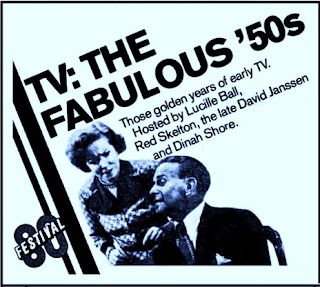 Here's one example: on Wednesday night at 8:00 p.m., following the latest Jacques Cousteau documentary (a constant over the years in these issues, don't you think?), WENH has TV: The Fabulous 50s, a 90-minute retrospective on "television's golden age" with sketches from Milton Berle, Ernie Kovacs, Jackie Gleason and Art Carney, and clips from shows like The Untouchables, Gunsmoke, I Love Lucy, Frank Sinatra and Paul Newman in a musical version of Our Town on Producers' Showcase An all-star list of hosts—Lucille Ball, Red Skelton, Mary Martin, Dinah Shore, Michael Landon and David Janssen—share their memories from those days.
Here's one example: on Wednesday night at 8:00 p.m., following the latest Jacques Cousteau documentary (a constant over the years in these issues, don't you think?), WENH has TV: The Fabulous 50s, a 90-minute retrospective on "television's golden age" with sketches from Milton Berle, Ernie Kovacs, Jackie Gleason and Art Carney, and clips from shows like The Untouchables, Gunsmoke, I Love Lucy, Frank Sinatra and Paul Newman in a musical version of Our Town on Producers' Showcase An all-star list of hosts—Lucille Ball, Red Skelton, Mary Martin, Dinah Shore, Michael Landon and David Janssen—share their memories from those days.What you have to remember about these pre-VCR/DVD and YouTube years is that compilation retrospectives like this were often the only chance viewers had to see many of these programs from the 1950s. For every Twilight Zone, I Love Lucy and The Honeymooners, which seem never to have been out of circulation, there were probably ten others that were seldom seen in syndication by the 1980s, including classics like The Fugitive and The Untouchables. (Hour-long shows never did do well in syndication.) PBS was about the only place you could see Ernie Kovacs, or some of the early anthology dramas. I was always a sucker for shows like these, going back to the anniversary specials that each of the networks did in the late 1970s, and I'd have to think that I watched this (I'm sure KTCA in the Twin Cites must have shown it), but I confess to having no memory of it.
It's easy to complain about those favorite programs that haven't yet made it to DVD or streaming (or the gray market), and I do as much of it as anyone. Back in 1980, though, we all would have been astonished to have these shows available to watch any time we wanted, thanks in no small part to the technology we talked about at the top of the page. Not bad, huh?
Speaking of video, TV Guide's resident technical expert, David Lachenbruch answers questions about TV technology once a month, and this month a letter writer asks, "Will the networks ever release videocassetts or videodiscs of some of their old classic shows?" After pondering the question, Lachenbruch says it's possible. "As the number of video players grows, we're likely to see some albums of alltime television favorites, but they're more likely to be issued by producers and packagers, since the networks rarely own the copyrights on programs they broadcast." Some British shows have made it to tape already, along with highlights of major news events, and owners of programs "see their old products as potential goldmines and are exploring potential home-video release." I wonder if he ever imagined. . .
t t t
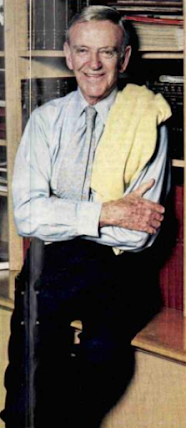 While we're on the subject of PBS, perhaps the best entertainment of the week is the network's two-part biography of Fred Astaire. Part one, Fred Astaire: Puttin' on His Top Hat (airing Saturday and Sunday on various affiliates) focuses mainly on Astaire's movies with his longtime partner Ginger Rogers, and includes clips of famous dance routines from Flying Down to Rio, The Gay Divorcee, Gtop Hat, Follow the Fleet, Swing Time, Shall We Dance, and Carefree.
While we're on the subject of PBS, perhaps the best entertainment of the week is the network's two-part biography of Fred Astaire. Part one, Fred Astaire: Puttin' on His Top Hat (airing Saturday and Sunday on various affiliates) focuses mainly on Astaire's movies with his longtime partner Ginger Rogers, and includes clips of famous dance routines from Flying Down to Rio, The Gay Divorcee, Gtop Hat, Follow the Fleet, Swing Time, Shall We Dance, and Carefree. That's followed on Monday by Fred Astaire: Change Partners & Dance, which features some of Astaire's other partners, including Rita Hayworth, Betty Hutton, Leslie Caron and Barrie Chase, and includes comments from luminaries such as Bob Fosse, Jerome Robbins, and Rudolf Nureyev. Both parts are narrated by Joanne Woodward.
As for the great man himself, "I can dance, but I don't want to," he tells TV Guide's Ellen Torgerson Shaw. It's not as if he doesn't keep busy; he spends time at the track, doing crossword puzzles, and writing songs, and is a daily devotee of As the World Turns and The Guiding Light, a habit he picked up from his mom. He still does TV on occasion, and he appears occasionally on The Tonight Show. He's more or less indifferent to his fame; he doesn't own copies of any of his movies (although he has "hours of dance on film."), and one gets the idea that he's slightly uncomfortable with it all. "It's nice when people like what I've done," he says. "I accept it with appreciation. But no, I don't love it. It's not my nature. All I ever did was to want to make good, not come up empty."
Is there anyone today with the elegance of Fred Astaire? I mean, he doesn't walk across the stage as much as he does glide; the man could make breathing into an art form.
t t t
 On weeks when we can, we'll match up two of the biggest rock shows of the era, NBC's The Midnight Special and the syndicated Don Kirshner's Rock Concert, and see who's better, who's best.
On weeks when we can, we'll match up two of the biggest rock shows of the era, NBC's The Midnight Special and the syndicated Don Kirshner's Rock Concert, and see who's better, who's best.Kirshner: Music by KISS, Gloria Gaynor and New England; comedy by Roger & Roger.
Special: Andy Gibb (host), Tom Petty and the Heartbreakers, Queen, Paul Warren & Explorer.
We may be short on descriptions this week, but we're long on content. Gloria Gaynor's the epitome of disco, and KISS—well, KISS is still going strong today. But Midnight Special has, quite literally, a hall of fame show tonight (plus its own disco Gibb), and there's really nothing Kirshner can do about it. His show will survive, but Special breaks his heart with the win.
t t t
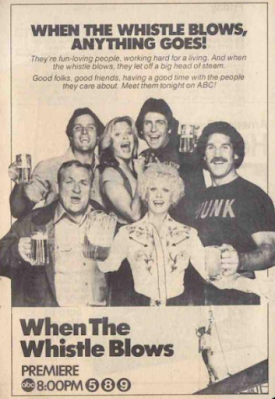 We've got some new shows debuting this week, and some of these ring absolutely no bell at all. For instance, take When the Whistle Blows, an hour-long sitcom that premieres this Friday at 8:00 p.m. on ABC. Dolph Sweet, who will have much more success next season in Gimme a Break!, stars in this story of construction workers "and their search for fun both on and off the job." It sticks around for ten episodes. I don't think I've ever heard of it; is it just me? (Maybe I don't remember it because of the show it's up against, Here's Boomer, premiering at the same time on NBC. Or maybe not.)
We've got some new shows debuting this week, and some of these ring absolutely no bell at all. For instance, take When the Whistle Blows, an hour-long sitcom that premieres this Friday at 8:00 p.m. on ABC. Dolph Sweet, who will have much more success next season in Gimme a Break!, stars in this story of construction workers "and their search for fun both on and off the job." It sticks around for ten episodes. I don't think I've ever heard of it; is it just me? (Maybe I don't remember it because of the show it's up against, Here's Boomer, premiering at the same time on NBC. Or maybe not.)Tuesday night sees the debut of United States (10:30 p.m., NBC), one of the more interesting experiments in what would come to be known as the "dramedy." United States stars Beau Bridges and Helen Shaver, and focuses on the everyday trials and tribulations of a married couple (the title refers not to the name of the country but to the state of two people being united in marriage), and featured neither a laugh track nor background music. I actually do remember this series; even saw an episode of it, I think; I'd have had to look fast, since it ran for only seven episodes. Some people thought it was just ahead of its time, and that may be true, since both thirtysomething and Gilmore Girls took aspects of the show and put it to better use. In my trusty Complete Directory to Prime Time Network and Cable TV Shows, Brooks and Marsh call it "tedious, boring and didactic," while another critic called the stars' characters "surprisingly unlikable." That's about how I remember it.
A couple of shows that aren't new but are making their season debuts are From Here to Eternity (Monday at 9:00 p.m. and another episode Wednesday at 10:00 p.m., NBC), a spinoff of last season's successful miniseries that returns William Devane but not Natalie Wood (Barbara Hershey instead); and The Facts of Life (Wednesday, 9:30 p.m., NBC), a spinoff from Diff'rent Strokes that stars Charlotte Rae, Lisa Whelchel, Kim Fields, Mindy Cohn and Nancy McKeon. Eternity's run is somewhat less than eternal; it won't last the year. The Facts of Life, on the other hand, lasts until May 1988, and when it leaves the air it's as one of the longest-running and most-beloved sitcoms of the decade, and that's a fact.
One show that isn't new but is equally short-lived is Pink Lady and Jeff (Friday, 9:00 p.m, NBC), and while I never saw it, I certainly remember it—you know, in the same way you remember the Titanic, the Hindenberg, the Edsel. The show features the Japanese singing duo Pink Lady, who were very successful in their home country but were hampered in their attempts to make it big here by the fact they couldn't speak English, and comedian Jeff Altman, who could speak English and served as the host of the show. If you remember me writing about the 60s show Jimmy Durante Presents the Lennon Sisters, that was a better fit than this. Pink Lady didn't do much for the legacy of Fred Silverman, that's for sure.
t t t
Finally, a look at the show that symbolizes the 1980s better than anything else.
Dallas premiered in April 1978, a little under two years ago, and by the time it leaves the air in 1991, it will be have become one of the most iconic programs in television history, credited by some Dallasites with helping to finally rehabilitate the city's image following the assassination of JFK (along with the Dallas Cowboys, that is); later this year, the answer to "Who Shot J.R.?" will be, to the time, the most-watched television episode in history.
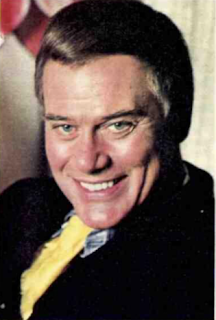 That's due in no small part to J.R. Ewing himself, Larry Hagman, who loves playing the bad guy. He calls J.R. a "miserable crud," and proudly tells Dwight Whitney, "I love him. I really do." The fact that such an evil, ruthless, unlikable character could become a folk hero is a testimonial to the actor's inherent likability, and he's grateful to the show for saving his career from underwhelming roles in B-grade shows and movies; in his most successful previous series, I Dream of Jeannie, he was overshadowed by co-star Barbara Eden (he was on-screen 80 per cent of the time, mostly to set up the punchline for Eden, who would breeze in and out of the scene; "He got lost in the shuffle."), not unlike the way he'd been overshadowed in his personal life by his famous mother, Mary Martin. When he accepted the role of J.R., his other choice was a sitcom called The Waverly Wonders, "I didn't find it humorous," he says. The role eventually went to Joe Namath. It didn't last long.
That's due in no small part to J.R. Ewing himself, Larry Hagman, who loves playing the bad guy. He calls J.R. a "miserable crud," and proudly tells Dwight Whitney, "I love him. I really do." The fact that such an evil, ruthless, unlikable character could become a folk hero is a testimonial to the actor's inherent likability, and he's grateful to the show for saving his career from underwhelming roles in B-grade shows and movies; in his most successful previous series, I Dream of Jeannie, he was overshadowed by co-star Barbara Eden (he was on-screen 80 per cent of the time, mostly to set up the punchline for Eden, who would breeze in and out of the scene; "He got lost in the shuffle."), not unlike the way he'd been overshadowed in his personal life by his famous mother, Mary Martin. When he accepted the role of J.R., his other choice was a sitcom called The Waverly Wonders, "I didn't find it humorous," he says. The role eventually went to Joe Namath. It didn't last long.He took to the role instantly. He was from Texas. His father, a small-town Texas lawyer, represented oil interests. He understood these people, what made them tick, and he knew he could make the show work. The final offer from the producers was "insulting," but he was willing to live with it. And the rest is history.
His castmates recognize him as the best actor on the show. He analyzes the script thoroughly, adjusts the dialogue to give the cadence more of a Texas flow, substitutes gestures and expressions for lines when he can. The show, in its second season, is a massive hit. He's made peace with his past, and with his mother's fame, and he brings a joyfulness to J.R. Ewing while the writers give him ever more outrageous storylines. Yes, life is good for Larry Hagman. "You seldom get a hit of this magnitude in your life. I've had two," he tells Whitney. "I'm not rich yet. I just think I'm ready."
And that's a good a way to finish this look at the 1980s, with a show that epitomizes the '80s better than anything. TV
Published on March 06, 2021 05:00
March 5, 2021
Friday Flashback: Twinkles
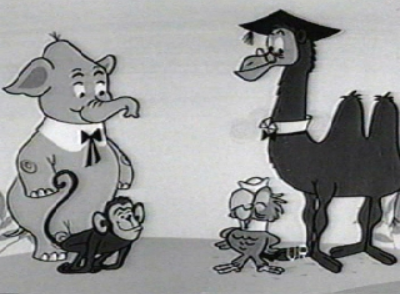
It doesn't happen often, but this week's classic TV blogosphere was pretty empty, so I thought I'd carry thinks over until next week. Instead, I decided to pick up whatever was near me, and write about that. So that's how we happen to be spending Friday talking about Twinkles, "the only cereal in the storybook package."

The ad above comes from the back cover of a 1961 TV Guide. That's the space that was usually reserved for cigarette ads; I wonder how much General Mills had to pay to get this prime bit of advertising real estate?
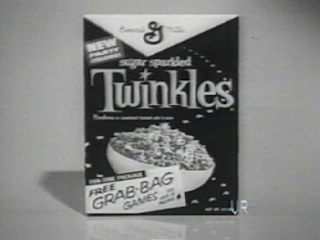 Anyway, Twinkles the elephant was created by
Total Television
, those great folks that brought us Tennessee Tuxedo, Underdog and other classics of the day, and although Twinkles never had a series of its own, it appeared as a frequent commercial on many of the cartoons of the day, particularly
Linus the Lionhearted
. Eventually the FCC blew the whistle on Twinkles ("This isn't entertainment—it's advertising!" which only applies to about 99 percent of today's movies*), and the cereal went on without its mascot, in a much blander bit of packaging, before disappearing from the shelves altogether.
Anyway, Twinkles the elephant was created by
Total Television
, those great folks that brought us Tennessee Tuxedo, Underdog and other classics of the day, and although Twinkles never had a series of its own, it appeared as a frequent commercial on many of the cartoons of the day, particularly
Linus the Lionhearted
. Eventually the FCC blew the whistle on Twinkles ("This isn't entertainment—it's advertising!" which only applies to about 99 percent of today's movies*), and the cereal went on without its mascot, in a much blander bit of packaging, before disappearing from the shelves altogether.*Not only movies, but try telling it to the ad executives who come up with the Super Bowl commercials. And do you really want us to believe those viewers are less impressionable than kids?
Personally, I don't think there's much doubt that the "well-intentioned" reformers of the '60s caused the end of local kids' TV, and I don't know that the late-60s FCC ruling that banned commercial tie-ins wound up doing much good. Subsequent changes in the law wound up giving us cartoons that weren't anything more than half-hour commercials anyway (G.I. Joe, Pokémon, etc.), so in the end these laws probably did more harm than good. (A debatable point, to be sure, in case anyone wants to pursue it.)
Because of the FCC, Twinkles never appeared in syndication, but you can get a glimpse of him (her? it?) in this clip:
Twinkles wasn't the only breakfast cereal with a TV tie-in, though - check out this wonderful page for more of your favorite animated cereal characters. And if you want to read more about Total Television, you'd do well to have this terrific book by Mark Arnold on your shelf. (Although, unlike my copy, yours probably won't be autographed.) TV
Published on March 05, 2021 05:00
March 3, 2021
TV Jibe: the modern game show
Published on March 03, 2021 05:00
It's About TV!
Insightful commentary on how classic TV shows mirrored and influenced American society, tracing the impact of iconic series on national identity, cultural change, and the challenges we face today.
- Mitchell Hadley's profile
- 5 followers




